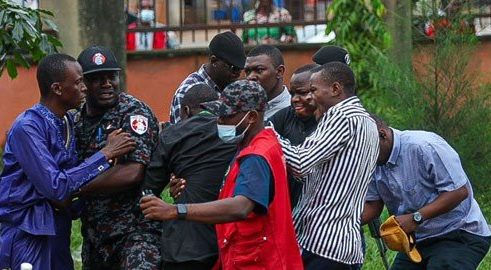As the Edo State governorship election kicked off on Saturday, September 21, 2024, the Economic and Financial Crimes Commission (EFCC) arrested three individuals suspected of attempting to buy votes at a polling unit in Egor Local Government Area. The EFCC, known for its anti-corruption efforts, had earlier announced its deployment of operatives across the state to ensure that the election process remained free from financial inducements.
According to reports, the arrest occurred around 10:00 am, with the EFCC swooping in on two males and a female who were allegedly lurking around the polling unit. These individuals were said to be attempting to influence the voting process by offering money in exchange for votes. The suspects were immediately taken into custody, but the arrest sparked a confrontation with local residents who felt the individuals were unfairly targeted.
Residents Protest Arrest, Brief Scuffle Ensues
The arrests sparked outrage among some local residents, leading to a brief but intense scuffle between the EFCC operatives and members of the community. Eyewitnesses reported that the residents, some of whom claimed to know the suspects, protested the arrests, accusing the EFCC of victimizing innocent individuals. The crowd reportedly attempted to block the operatives from whisking the suspects away, insisting that they had no involvement in vote-buying.
The EFCC, however, remained firm in its stance, eventually managing to remove the suspects from the scene. The agency later released a statement reaffirming its commitment to maintaining the integrity of the election process. This confrontation highlights the delicate nature of anti-corruption enforcement during elections, where suspicions of bias or unfair treatment can easily escalate into conflict.
EFCC’s Commitment to Electoral Integrity
The EFCC had previously made it clear that it would be deploying its operatives to oversee the Edo governorship election, with a strong focus on preventing vote-buying and other forms of electoral malpractice. In a statement issued a day before the election, the anti-graft agency emphasized its determination to ensure a fair and transparent voting process across the state.
“Ensuring that voters cast their votes democratically, without any form of financial inducement, is a key priority for the EFCC in this election,” a spokesperson for the commission said. The agency has been praised in the past for its efforts to curb election fraud, and its presence in Edo State is expected to deter would-be vote buyers from engaging in illicit activities. However, incidents like the scuffle in Egor Local Government Area underscore the challenges of enforcing such measures in an often tense and politically charged environment.
Also A Woman Penalized for Defying Movement Restrictions Ahead of Governorship Election
A woman in Edo State faced public penalties from security operatives on the morning of the highly anticipated governorship election. She was accused of violating electoral regulations put in place to ensure a peaceful and orderly voting process. The restrictions were imposed by the Inspector-General of Police, Kayode Egbetokun, who announced a statewide ban on non-essential movement from 6:00 AM to 6:00 PM on the day of the election. This measure aimed to reduce the risk of electoral violence and ensure a smooth voting process in the state’s gubernatorial race.
According to reports, the woman was apprehended along a major highway in Benin City. She was allegedly found wandering on the streets despite the movement ban and was swiftly confronted by security officers enforcing the restrictions. The operatives, in their bid to maintain compliance with the electoral guidelines, ordered the woman to kneel on the street with both hands raised as a form of punishment. The public nature of the penalty sparked mixed reactions from passersby, some of whom felt the measures were excessive, while others believed they were necessary to enforce discipline and ensure order on election day.
Movement Restrictions and the Importance of Compliance
The movement restriction order issued by Inspector-General Egbetokun was part of a broader security strategy aimed at maintaining peace during the Edo State governorship election. Given the history of electoral violence and unrest in Nigeria, law enforcement agencies across the country have increasingly adopted similar measures in volatile regions during elections. By restricting movement, authorities hope to minimize the possibility of large-scale disturbances, ballot box snatching, and other criminal activities that could disrupt the electoral process.
However, the enforcement of such restrictions often presents challenges, as citizens may be unaware of the specific details or may choose to ignore the regulations. In this case, the woman’s defiance of the movement ban led to immediate consequences. Security operatives on the ground have been tasked with ensuring full compliance with the rules, and their swift action against violators is intended to send a message to the general public. While some may view the enforcement tactics as harsh, others argue that they are necessary to safeguard the integrity of the election and prevent potential violence.
Table of Contents
Discover more from OGM News NG
Subscribe to get the latest posts sent to your email.














